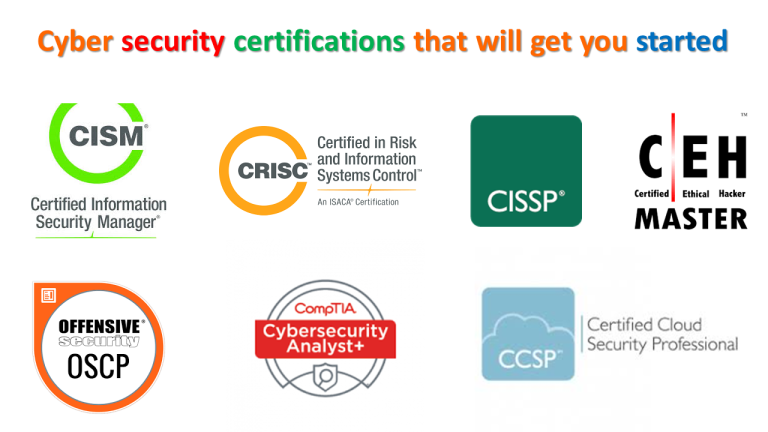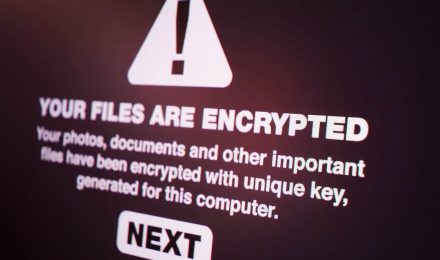
THE TOP CYBERSECURITY CERTIFICATIONS IN 2025
In today’s digital age, cybersecurity has become a critical concern for organizations worldwide. With cyber threats evolving at an unprecedented pace, businesses are increasingly relying on skilled professionals to safeguard their sensitive data and systems. For those looking to advance their careers in this dynamic field, earning the right cybersecurity certifications is essential. These certifications not only validate your expertise but also demonstrate your commitment to staying ahead of the curve in cybersecurity.
Here are the top 5 cybersecurity certifications every cybersecurity professional should consider:
1. Certified Information Systems Security Professional (CISSP)
The CISSP certification, offered by (ISC)², is one of the most prestigious and globally recognized credentials in the cybersecurity industry. It’s designed for experienced security practitioners, managers, and executives who want to prove their expertise in designing, implementing, and managing a best-in-class cybersecurity program.
Why it’s important:
- Covers a broad range of topics, including security and risk management, asset security, and software development security.
- Demonstrates your ability to lead and manage cybersecurity initiatives.
- Often required for senior-level roles like Chief Information Security Officer (CISO).
2. Certified Ethical Hacker (CEH)
Offered by the EC-Council, the CEH certification is ideal for professionals who want to specialize in penetration testing and ethical hacking. This certification equips you with the skills to think and act like a hacker, enabling you to identify vulnerabilities before malicious actors can exploit them.
Why it’s important:
- Focuses on hands-on skills like network scanning, system hacking, and social engineering.
- Prepares you for roles in penetration testing, vulnerability assessment, and red teaming.
- Highly valued by organizations looking to proactively secure their systems.
3. CompTIA Security+
The CompTIA Security+ certification is an excellent entry-level credential for those new to cybersecurity or looking to solidify their foundational knowledge. It covers essential topics like network security, threat management, and cryptography.
Why it’s important:
- Provides a strong foundation for more advanced certifications.
- Recognized by employers across industries as a benchmark for basic cybersecurity skills.
- Often a prerequisite for roles like security administrator or network administrator.
4. Certified Information Security Manager (CISM)
The CISM certification, offered by ISACA, is tailored for professionals who manage, design, and oversee an organization’s information security program. It’s ideal for those aspiring to move into leadership roles within the cybersecurity domain.
Why it’s important:
- Focuses on governance, risk management, and incident management.
- Demonstrates your ability to align cybersecurity strategies with business goals.
- Highly respected in industries with strict regulatory requirements, such as finance and healthcare.
-
5. Certified Cloud Security Professional (CCSP)
As organizations increasingly migrate to the cloud, the demand for cloud security expertise has skyrocketed. The CCSP certification, offered by (ISC)², validates your ability to secure cloud environments and manage cloud-related risks.
Why it’s important:
- Covers cloud architecture, data security, and compliance in cloud environments.
- Ideal for professionals working with platforms like AWS, Azure, and Google Cloud.
- Positions you as a specialist in one of the fastest-growing areas of cybersecurity.
Why Cybersecurity Certifications Matter
Earning cybersecurity certifications is more than just a way to boost your resume. These credentials provide:
-
- Credibility: Certifications validate your skills and knowledge, making you a more attractive candidate to employers.
- Career Advancement: Many organizations require certifications for promotions or specialized roles.
- Higher Earning Potential: Certified professionals often command higher salaries than their non-certified peers.
- Continuous Learning: Certifications ensure you stay updated on the latest trends, tools, and best practices in cybersecurity.
Final Thoughts
The cybersecurity landscape is constantly evolving, and staying ahead requires a commitment to continuous learning and professional development. Whether you’re just starting your career or looking to take it to the next level, investing in the right cybersecurity certifications can open doors to new opportunities and help you make a meaningful impact in the fight against cyber threats.
At THE ICT WEB, we are committed to guiding individuals toward successful and fulfilling careers in cybersecurity, both in Uganda and across the globe. Whether you’re just starting your journey or looking to advance your expertise, we provide the resources, training, and support you need to thrive in this dynamic cybersecurity field. Feel free to reach out to us for your training needs today at + (256) 781 353987 or drop us an email at [email protected]. Let’s embark on a journey towards innovation and excellence together! Which certification will you pursue next?






